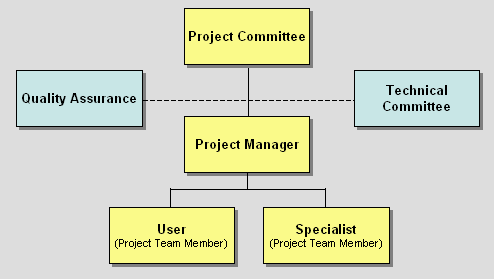What project roles does a project require?

Minimally, the following project roles are required in every project:
-
Project manager
Plans, coordinates, controls and supervises the project work as defined in the project plan.
-
User (customer representative, end-user representative)
Represents the user's interests in the project; participates actively as solicited by the project manager (e.g. in formulating requirement specifications and in acceptance tests).
-
Specialist (organization, analysis, operations, etc.)
Executes the project tasks assigned by the project manager and actively participates in his/her domain of expertise.
-
Project committee (customer, supplier, project sponsor)
Makes management-level decisions, supervises and controls the project process by approving the project plan, releasing the project phases, checking milestones,stating its opinion on important project changes, and formally accepting the main project results.
The project sponsor has the overall responsibility and chairs the project committee.
The customer is represented in the project committee, and by the user (possibly supported by specialists) as well as in the technical committee.
The supplier is also represented in the project committee and by his specialists.
Depending on the size and type of project, additional project roles are required, e.g.:
-
Technical committee for technical issues that transcend organizational boundaries;
-
Quality assurance in large projects; the project manager usually provides quality assurance in small projects;
-
Configuration management, especially in large IT projects to ensure the integrity of the development and that its results can be reproduced, etc.
Developed with the ZHW Zurich University of Applied Sciences, Winterthur.
Copyright © 1999-2005 by STS Sauter Training & Simulation SA. All Rights Reserved.
|
